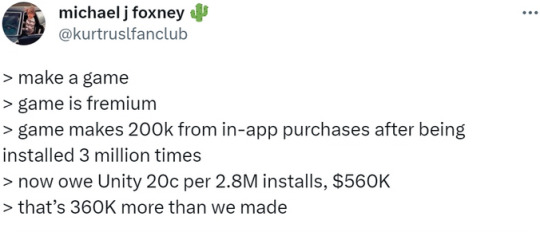I am a human. Demonstrably. I am interested in things. Here are the things. All the things.
Don't wanna be here? Send us removal request.
Text
Unity's Changes
On the 12th of September Unity released a blog post concerning changes being made to their plan pricing and packaging updates. The intention behind the change is the generate more income for the company. From Unity Blog...
"Effective January 1, 2024, we will introduce a new Unity Runtime Fee that’s based on game installs. We will also add cloud-based asset storage, Unity DevOps tools, and AI at runtime at no extra cost to Unity subscription plans this November."
Unity's services consist of two products: The Unity Engine, which is the game engine used to create projects, and the Unity Runtime, which is the code the execute on a player's device that allows games made with the engine to run.
Simply put, Unity will now be charging a fee "each time a qualifying game is downloaded by an end user." The reasoning given for this change is that "each time a game is downloaded, the Unity Runtime is also installed."
While many (basically all) developers have used their collective voices to reply with a unanimous "nope", many people do not understand the very important specifics of how this will be implemented.
These fees will only take effect when the preexisting thresholds have been met. They will only be applied once a game has reached both a set revenue figure and a set lifetime install count. From the blog:
Unity Personal and Unity Plus: Those that have made $200,000 USD or more in the last 12 months AND have at least 200,000 lifetime game installs.
Unity Pro and Unity Enterprise: Those that have made $1,000,000 USD or more in the last 12 months AND have at least 1,000,000 lifetime game installs.

While this may not seem to be such a bad thing, especially since the reasoning behind the change (their Runtime product being distributed) is quite reasonable. However there are a litany of issues this will pose for developers. The smallest scale developers, such as indie devs and studios are unlikely to feel any sort of pressure from this, and the large, AAA studios also wont feel the brunt of the new pricing plan. The weight of this change falls directly onto the smaller-but-not-small studios. These studios making games for a more significant budget will essentially have these budgets put under more strain, because as soon as they begin to approach breaking even or perhaps making a profit on their projects, Unity will step in a start charging them from there on out. It is also unclear whether the developers alone will have to pay this new fee or whether it will be shared by publishers as well.
Developers are largely unhappy with this new plan because studios almost always make commercial games on very thing margins. Charging a couple cents per install does not sound like much but it can and will mean the difference between financial success and closure for many smaller studios who otherwise would have ended with their balance sheets in the green.
It is also important to be aware that, while these changes are scheduled to take effect from the start of 2024, the thresholds are retroactive, which means that if you already have reasonable install and revenue numbers (thus qualifying for the fees) you will be immediately forced to pay moving forward.
On a more informal note, there have also been some jokes made that this scheme will make it possible for players to actively harm developers if they wish. The fee is charged when an end-user (customer) downloads a game. Note that they did not say "purchases", but "downloads." Technically, this would mean that a person can buy a game (developer gains one instance of revenue) and then repeatedly download, delete and re-download the game, charging this fee each time they do this. Whether this was a poor choice of wording or a miscommunication is unclear at this time, but well let's certainly hope this new plan doesn't open up this possibility.
There are also numerous other important considerations Unity have not commented on. Do installs of pirated games count? How will these threshold figures be tracked? Also, as a massive concern, what about games that rely on in-app purchases for revenue. Below is a tweet that concisely highlights the problem.

There is also the problem of free games. This pricing plan does not take into account how much the game costs at all. Developers making a massively successful free game would end up having to pay Unity to sell a free product.
Many developers and studios are now seriously considering simply ditching Unity all together. With Unreal's much more reasonable pricing plans and the release of UE5, unless either some very significant "miscommunications" are cleared up or the plan is scrapped entirely, this will likely be the beginning of the end for Unity. As a learning indie developer myself, having been a die-hard Unity supported until this announcement, I do not know how to express my disappointment, and if Unity follows through with this scheme on 01/01/2024, even if they reverse it later, I will never open another one of this fucking greedy company's products ever again.
Sources: - https://blog.unity.com/news/plan-pricing-and-packaging-updates - https://www.youtube.com/watch?v=JQSDsjJAics
11 notes
·
View notes